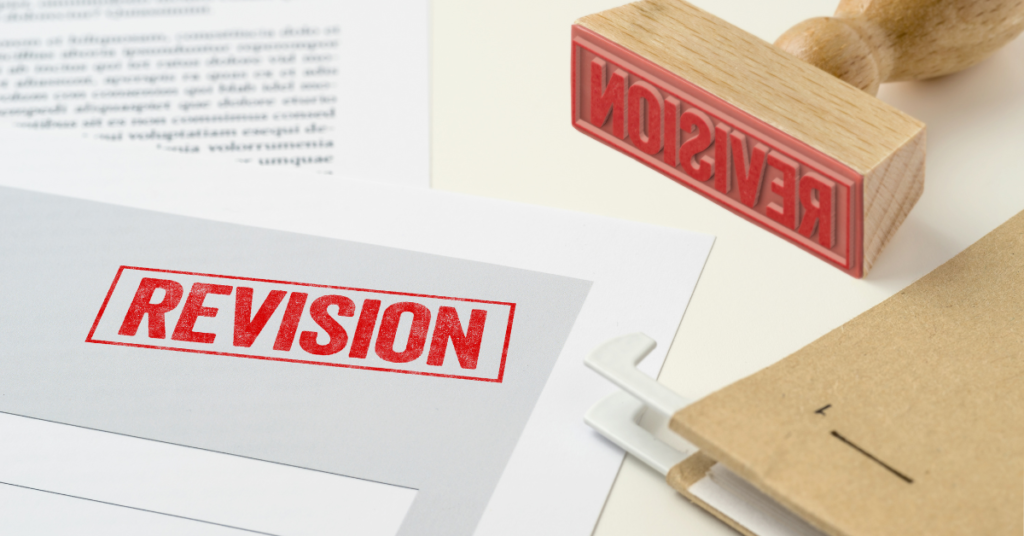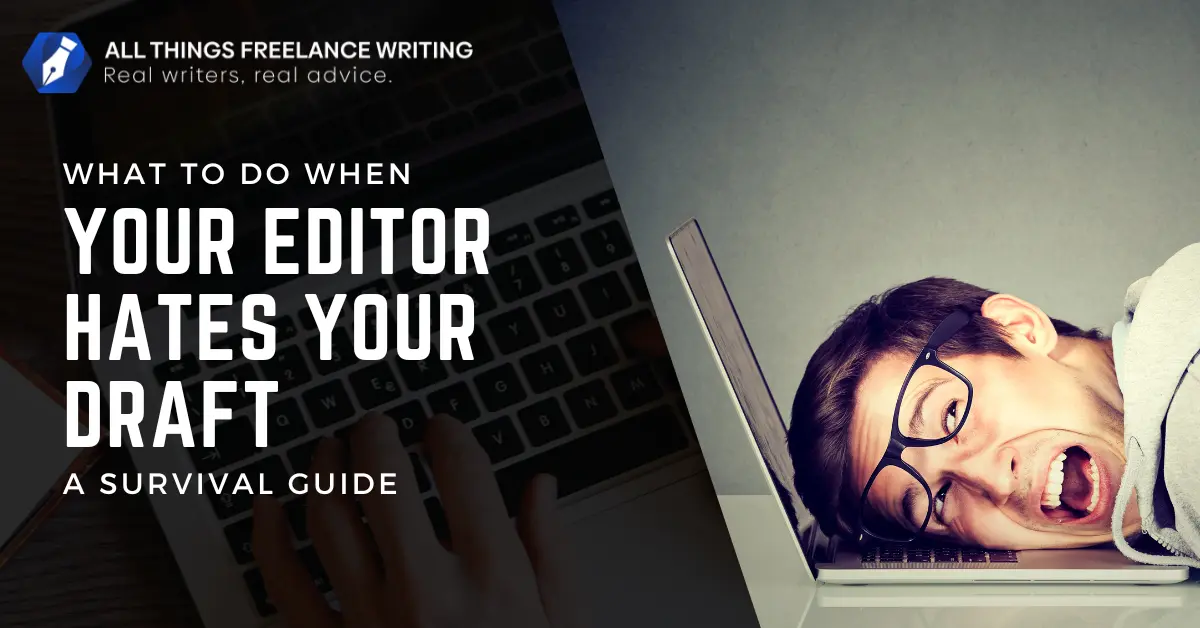Back when I started freelancing, I somehow managed to land my first four-figure gig with a small private insurance firm. The company hired me to revamp a set of direct mail brochures and sales letters.
Two weeks of drafting, pruning, polishing, and rewriting followed. With my drafts complete, I felt like I had just finished a marathon. So, when the marketing editor called me, I answered the phone and anxiously awaited the praise I knew my hard work deserved.
“I’ve looked over everything,” he said with a grumble, “and I’m not sure that we’re quite on the same page.”
If reading those words put a knot in your stomach or a lump in your throat, you’ve likely learned that negative feedback is an unavoidable hazard of our business. Moreover, you’ve probably encountered someone who didn’t like your work even when you’ve tried to put your best foot forward.
So, what do you do when that sort of thing happens? How do you keep yourself from spiraling? Well, in the decade or so since my interaction with that managing editor, I’ve collected a few tips on how to keep myself emotionally afloat. Hopefully, sharing them with you can offer a little comfort when your editor is on the warpath.
Know You’re Not Incompetent

The natural impulse for many when they receive negative feedback from an editor is to panic and start questioning their competence. Especially if you’re new to the business. There’s a reason for this, and it involves your identity as a writer.
In their piece, The Emotional Work of Revision, scholars Bruce Ballenger and Kelly Myers identify the tendency to doubt yourself as a form of “cognitive dissonance,” a term popularized by social psychologist Leon Festinger. Moreover, Ballenger and Myers indicate this dissonance is a product of “tension between who [a writer] is, and who they want to be.” Essentially, that means we’re idealizing our writing selves.
But because we have this idealized image, when negative feedback occurs, we experience tension and relate it to our skill level versus what we perceive as the ideal. In other words, the reason we have the impulse to question ourselves is because we believe that our idealized writer self wouldn’t get the type of feedback we received.
I like to use this idealized writer differently. Instead of thinking about how they would never get negative feedback, I try to imagine how they would handle getting negative feedback. Then act accordingly.
I ask myself, would that writer take it in stride, or would they throw their laptop off a bridge? Would they doubt themselves when the evidence shows otherwise? Would they believe themselves to be incompetent? Probably not.
Recognize When Redlines Are Part of a Client’s Process

Often, when we receive negative feedback, we forget to consider that the source of the feedback may also be working through their own creative process. I have a current client, for example, who regularly gives me vague instructions at the outset of a project. No matter what I offer in the early drafting stages, this client is never happy with it.
At first, I took their constant negative reaction to mean that I was the problem. But the client kept calling and asking for more and more work. It was strange. Then a light bulb went off. After a year of this pattern, I realized what the client needed was a touchstone to start their own creative process.
For these clients, clarifying their vision starts by determining what isn’t going to work. It’s the catalyst for generating what will. Simply put, sometimes these clients have trouble expressing what they want until they can confidently rule out what they don’t. Unfortunately, that means offering scalding feedback is a step in their process.
In Naming What We Know, Montana State University Professor of Rhetoric and Writing Studies, Doug Downs, suggests the creative process is “analogous to driving with headlights. The headlights reach only a fraction of the way to the destination…Writing the first draft lets the headlights illuminate the next distance ahead.” Clients like the one I described need you to turn on those headlights so they can figure out where they are.
If we understand that, those rounds of negative feedback become more like revision or an attempt at collaborative clarity. That makes them much less personal and much easier to digest.
However, not all clients are like this. If you don’t like that process, you can look for clients with a clear vision for the final product. You can also protect yourself by adding revision limits to your contract.
Remember, It’s Not Always About You

This sounds like silly advice, but negative feedback can come because of someone else having a bad day. Maybe their kid is dropping out of college, or perhaps they got stuck in rush-hour traffic. In those instances, an editor may be overly critical of your work despite your best efforts.
Not that a bad day is a good reason to treat another person poorly. It’s not. But off days happen. Unfortunately, there’s nothing you can do except recognize that these situations aren’t about you. I’ve found it best to accept the feedback, try not to take it personally, and move on from these one-offs.
But if your editor is unreasonably mercurial, you may need to have a conversation with them about your working relationship. Business should be beneficial for both parties. If it’s not, and you’re suffering, then it’s probably time to end the relationship. Don’t feel bad about doing so. Every so often, it’s better to lose a client to preserve your morale. No client is worth your sanity.
“Every so often, it’s better to lose a client to preserve your morale. No client is worth your sanity.”
Matt L. Hall
Be Honest When It Is About You

My final piece of advice is that sometimes you must be honest with yourself about your work. We all strive to put our best work into the world. But every so often that doesn’t happen. Occasionally, we miss a crucial piece of information, or we submit work that needed a few more drafts. In those cases, the negative feedback we receive may be justified.
It hurts to have those moments. And only you can determine whether the feedback you receive is in this category. Be honest with yourself and own up to your shortcomings. Then try to make it right and learn from what you’re being told. The key here, at least for me, is to try to recognize what the editor is really saying about your work.
Here’s an example: last week, after a particularly grueling meeting with an overseas marketing editor, I was told that some of my copy was “a bit too long.” That feedback struck me, and it initially made me angry. I thought to myself, “I’m a seasoned copywriter. Who is this client to tell me that my work is too long?”
I then let the copy sit while I stewed for the weekend. On Monday, I began revising. I tightened up wording in several places and completed three more drafts. Then I realized that the editor had been correct. The final submission was much stronger than the previous version. When the next round of feedback came, the editor was generous with their praise.
You’re Going to Survive
While navigating negative feedback isn’t always easy, it is a necessary part of this business. As someone who still sometimes struggles with it, I want you to know that you’re not alone. We’ve all been there. The important thing to remember is that you are in this business because it’s something you care about. If you didn’t care, then getting negative feedback wouldn’t be an issue.
Caring about our work is what makes us valuable in this business. It’s what empowers us to connect with people through our words. Even if it’s sometimes bittersweet. So, don’t worry. You’ve got this. Now, pick yourself up, and dust yourself off because it’s about time you got back to work.
“Caring about our work is what makes us valuable in this business. It’s what empowers us to connect with people through our words. Even if it’s sometimes bittersweet.”
Matt L. Hall
Want help finding new freelance writing clients? Sign up for the ATFW jobs newsletter to get 25-30+ new opportunities delivered to your inbox every Friday!


